Las Vegas seems to reinvent itself wholesale each decade, but few things have changed more in recent years than the sports landscape. In turn, sports have transformed the city’s sense of itself: It’s hard to deny that our town, always yearning for the big time, has arrived. The Super Bowl — the Super Bowl — is coming to Allegiant Stadium in February, a summit that less than 10 years ago seemed unrealistic, if not unreachable. At this point, the only sporting events that could (maybe) match the big game’s impact would be the World Cup or the Olympics.
But which local sporting events prepared the ground for this moment, both culturally and economically? For this list, we’re only considering events that happened within Clark County, so the UNLV basketball team winning the NCAA championship in 1990 is out, since that occurred in Denver. And unless tickets were sold and fans attended, it doesn’t qualify. In other words, no news events such as Jerry Tarkanian being hired or fired at UNLV, or plans for Allegiant Stadium being approved. That said, here, in chronological order, are the five sporting events that helped reshape Las Vegas: 
Sugar Ray Leonard vs. Thomas Hearns at Caesars Palace
September 16, 1981
Boxing had long been king in Las Vegas before this megafight, but the scheduled 15-round battle for the undisputed world welterweight championship between Hearns, the unbeaten World Boxing Association champion, and Leonard, the World Boxing Council titleholder and America’s favorite fighter, elevated the city’s claim as fight capital of the world. It was one of those magical nights in sports when the action lives up to the anticipation, and it ushered in a golden era of fights in Las Vegas and established the outdoor arena at Caesars Palace as the top site for blockbuster fights into the mid-1990s. A star-filled, sellout crowd of more than 23,000 packed the venue as another 300 million people watched on TVs worldwide. Leonard landed the more damaging blows throughout the fight, but it was the taller, lankier “Hitman” who controlled most of the action, leading Leonard’s trainer Angelo Dundee to famously exhort to his fighter after the 12th round, “You’re blowing it now, son. You’re blowing it.” Leonard roared back over the next two rounds and battered the fading Hearns until referee Davey Pearl stopped the fight in the 14th, giving Leonard a technical knockout victory. Hearns had been ahead on all three judges’ scorecards at the time. Later named Fight of the Year by Ring Magazine, it was the pinnacle of Leonard’s Hall of Fame career and remains one of the greatest world title fights in boxing history. 
NFR rides into the Thomas & Mack
December 7, 1985
Credit gaming legend Benny Binion and then-Las Vegas Events president Herb McDonald for leading the charge to revitalize what had traditionally been a lackluster month for Las Vegas. Oklahoma City had hosted the National Finals Rodeo since 1965, including a decade-long string of sellouts, so wresting away rodeo’s richest event was no easy task. With McDonald guaranteeing double the prize money for the cowboys and an even bigger increase for contractors, along with Binion ensuring comped rooms for the competitors, the Professional Rodeo Cowboys Association Board of Directors voted to a 6-6 tie before PRCA president Shawn Davis cast the deciding ballot in favor of Las Vegas. The pairing of city and event was a hit from opening night, with the PRCA’s top 15 money winners of the year competing in seven events over 10 nights (or “go-rounds”) before sellout crowds at the Thomas & Mack Center, and the highest-earning cowboy named PRCA All-Around Champion. (The first champ crowned in Las Vegas was Lewis Feild, who went on to repeat in 1986 and ’87.) The influx of participants and fans now brings an annual economic impact of about $180 million to Southern Nevada, with events such as the Cowboy Christmas shopping expo at the Convention Center and country acts in showrooms around the city transforming what had been a dead December into a Western wonderland. 
NASCAR revs up Las Vegas Motor Speedway
March 1, 1998
Casino owners Ralph Engelstad and William Bennett partnered to construct Las Vegas Motor Speedway for $200 million in the mid-’90s when there was no guarantee that the venue would ever be economically viable. Even after the speedway opened in September 1996 with a successful Indy Racing League event, its long-term success was still in question. However, the arrival of the NASCAR Cup Series 18 months later put the speedway on the fast track to financial success. About 135,000 people attended the inaugural Las Vegas 400, which aired nationally on ABC and culminated a three-day weekend of racing at the speedway that brought $40 million into the local economy. Boxing announcer Michael Buffer gave the command to start the engines, and Mark Martin won the race, edging Jeff Burton and season points leader Rusty Wallace for the victory. That December, Engelstad and Bennett sold the speedway for $215 million to Speedway Motorsports, which now owns and operates 11 racing facilities in the United States. In addition to hosting two NASCAR and two National Hot Rod Association events this year, the speedway has also hosted the three-night Electric Daisy Carnival music festival annually since 2011, generating more than $2.5 billion for the local economy over that span. 
NBA Summer League debuts at Cox Pavilion
July 13, 2004
Summer League visionary Warren LeGarie first pitched Las Vegas to former NBA vice president Rod Thorn in November 1999, but he received early resistance: The league didn’t want games played on any casino properties, among other concerns. But NBA commissioner David Stern finally gave LeGarie the go-ahead after a conversation during the 2004 NBA All-Star weekend. With little time to plan, that first Vegas Summer League included just six teams — Boston, Cleveland, Denver, Phoenix, Washington and Orlando, which featured No. 1 overall NBA Draft pick Dwight Howard — playing a combined 13 games over six days at UNLV’s Cox Pavilion. The event, then called the Vegas Summer League, drew about 8,000 fans. Though modest in scope, the league was deemed a great success; the following year it expanded to 16 teams. By 2007, the NBA put its official stamp on the summer league, which grew to include games at the adjacent Thomas & Mack Center. This past July, all 30 NBA teams competed in the league over 11 days, with all 82 games televised on ESPN, ESPN2 or NBA.TV. More than 130,000 fans attended the games. Over the league’s two decades, Las Vegas became the NBA’s unofficial home away from home, sparking the interest of other major sports leagues. 
Knights raise the Cup at T-Mobile
ArenaJune 13, 2023
A strong case can be made for the Golden Knights’ inaugural home opener on October 10, 2017, when first responders, survivors and victims of the October 1 mass shooting at the Route 91 Harvest music festival were honored before a 5-2 victory over Phoenix. There’s also an argument for the expansion Knights’ 6-4 victory over Washington in Game 1 of the the 2018 Stanley Cup Finals, which stoked citywide euphoria. But neither day can top the wave of joy that rolled across Clark County as the Golden Knights were in the midst of routing the Florida Panthers 9-3 in Game 5 of the best-of-7 Stanley Cup Finals before a franchise-record crowd of 19,058 at T-Mobile Arena (and many, many more gathered in bars, restaurants, and homes across the Las Vegas Valley). After the Panthers closed to within 2-1 early in the second period, a flurry of four VGK goals in the last 10½ minutes of the period all but put the game — and the series — on ice. By the third period, it wasn’t so much a contest as a coronation. That’s going to be a tough act to follow. ◆














